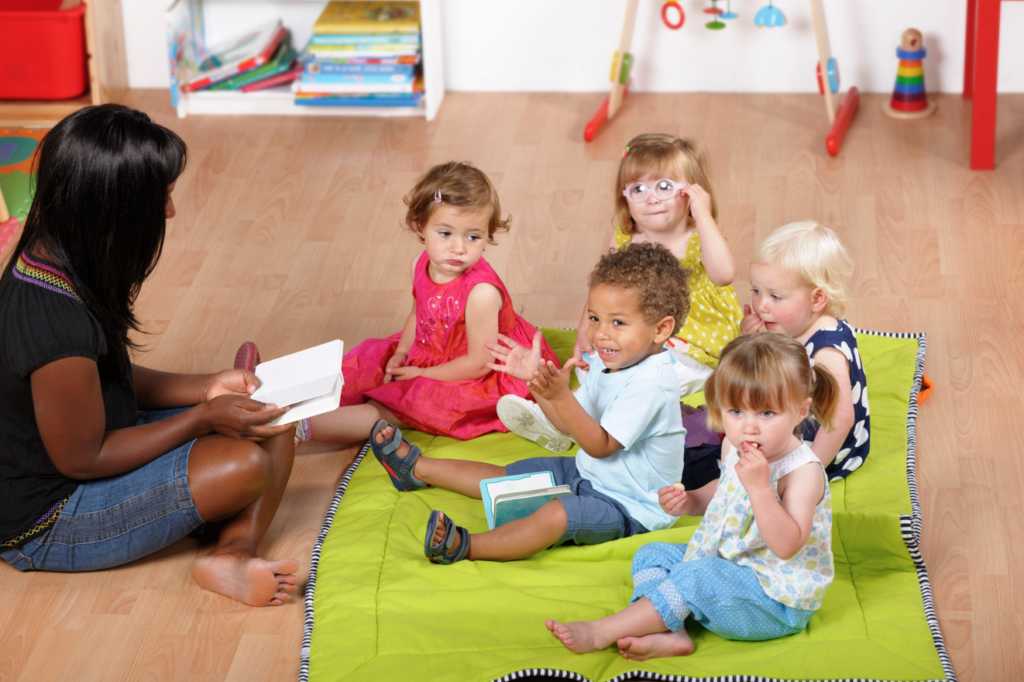What Age to Start Nursery UK

Many parents rely on a nurseries to help cover 9-5 childcare; just over 40% of UK children under 5 years go to nursery, that's over 4.5 million kids! But the first day of nursery can be equal parts excitement and nerves, for both you and your little one!
In this handy guide, we'll explore the things to consider if you're thinking about starting your little one at nursery; from what age to start nursery in the UK, how much it will cost, how to prepare, and where to access the government's childcare support schemes.
We'll highlight research examining the benefits of good quality early years education, and consider alternative childcare options that you might not have thought about. But first some terminology...
Nursery School vs Private Nurseries

There are two types of early years education that are both referred to as nursery care in the UK. These are nursery school (also called pre-school) and private nursery (sometimes called day nursery.)
All nurseries offer childcare for children under 5 years, are registered and inspected by Ofsted (or equivalent Inspectorates), and broadly follow the Early Years Foundation Stage principles and guidelines to support children's learning and development. However, there are some important differences it's helpful to be aware of.
Admission age
Private nurseries have their own policies based on their staff skillset and facilities. Many accept babies from the youngest age of 6 weeks, up until compulsory school age.
Nursery schools by comparison are for children aged three to five years old, with children normally eligible to start in the September following their third birthday.
Formal education vs play-based learning
Nursery schools are generally attached to, or closely associated with, a local primary school. The staff include professionally qualified teachers as well as nursery nurses.
The focus of activities tends to be on formal, structured learning like reading, writing and numeracy, that prepare children for school.
Private nurseries by comparison often have a greater mix of ages that includes babies and infants. The focus therefore tends to be more on socialisation, emotional development and play-based learning.
Private nurseries also offer meals, sleeping and nappy changing facilities for younger babies, which nursery schools typically do not.
Opening hours
Nursery schools are usually only open 9am until 3pm during term time. Most offer morning and afternoon sessions that are typically 2.5-3 hours long. A parent or carer may be expected to collect them in between sessions.
Whereas private nurseries have longer hours, often from 7am to 6pm and are normally open throughout the year, with some exceptions like bank holidays.
Application Process and Cost
State nursery schools are maintained and funded by the local authority. Applications are made through the relevant council website and places can be limited.
The fees for nursery schools are usually lower than private nurseries; 15 hours of free childcare is provided to eligible children (see government's childcare support schemes below.) The price for additional sessions are usually £5-8 per hour.
Many independent schools similarly provide nursery facilities that are run within, or close to, the main school. Prices vary and applications can be made directly with the school administration team.
Private nurseries are also independent businesses but are not associated with a school. Applications are directly with the nursery. The average prices for a full-time nursery place is £65-100 per day.
| Nursery Schools | Day Nurseries | |
|---|---|---|
| Supervision | Led by trained teachers alongside nursery staff | Staff typically hold childcare training certificates |
| Structure | More structured, educational activities | Emphasis on socialization and age-appropriate development |
| Affiliation | Attached to a local primary schools | Not directly affiliated with primary schools |
| Purpose | Higher importance on educational assessments | Focus on socialisation, daily care and play-based learning |
| Access to Resources | Access to attached school's facilities | May have their own resources and facilities |
| Operating Hours | Usually during school hours and term time | Business hours with extended hours availability |
| Age Range | Typically ages 3 to 5 years | Accommodates children from 6 weeks to 5 years |
| State Funding | State-funded (maintained nursery schools) | Independently operated. |
| OFSTED Registration | Registered and Inspected by Ofsted or equivalent Inspectorate | Registered and Inspected by Ofsted or equivalent Inspectorate |
| Average Price | Generally lower fees (£5-8/hr); government funded hours available | Varying fees (£65-100/day); government funded hours available |
| Availability | Limited spaces, may have waiting lists | Varies depending on location and demand |
The Best Age to Start Nursery

The decision to start your kids at a nursery is an individual one and really depends on your family's unique circumstances.
There's no right or wrong answer and no 'ideal' age to take this step. Some children relish the social experience and new environment that nursery brings, while other kids find it harder at the start.
From what age do nurseries accept children?
The age at which nurseries can take children varies. Many private nurseries will accept babies from 6 weeks right up until they start school, usually in the September after they turn 4 years.
Is attending nursery harmful to young babies?
For a lot of families the decision to start their little one in nursery may be determined by the need to return to work or other commitments. If they're still young you may be worrying that starting nursery early could cause them stress or be harmful to their development.
Research studies looking at young children suggest that there are temporary increases in stress levels when children first start in a new nursery. This can be particularly true for those under the age of one year.
These studies found that during the first few weeks of nursery, babies in particular experience higher average levels of the stress hormone cortisol compared to when they are with their parents. However, these stress levels return to normal after the initial adjustment period of a few weeks. After this time attending nursery at a young age was not linked to problems, and overall was found to be safe and beneficial to a child's social and emotional development.
One longitudinal study, the Study of Childcare and Development (SEED), measured thousands of children aged 2-4 years old, and found that attending nursery was associated with better academic results for Key Stage 1 Maths, Key Stage 1 Science and for a combined Key Stage 1 English and Maths outcome during school Year 2.
How do nurseries cater for young babies?
In the UK, nurseries are legally required to maintain a maximum staff ratio of 1:3 when caring for children under 2 years. This means one staff member is assigned to care for no more than three babies. The limit allows staff to give each baby lots of one-to-one care and attention, and respond promptly to their needs.
Many nurseries will also assign a 'key person' or 'key worker' that is your baby's primary caregiver within the nursery setting.' This key person is likely to build a strong bond with your baby, provide personalised care, and ensure that your baby feels secure and supported. They should communicate with you regularly, sharing updates about your baby's progress, and be there to address any concerns or questions you may have.
What training do nursery staff have before caring for babies?
Nursery staff members who work with young babies and children should undergo specialised training, usually in the form of a Level 3 qualification in Early Years Education. This qualification focuses on key aspects of learning, development and care of children from birth to 5 years old.
In addition to their formal qualifications, nursery staff may have specific experience in caring for young babies.
Finally, nursery staff should also receive training in first aid, including infant and child CPR, to ensure they know what to do in an emergency.
You may want to ask about these qualifications and experience when attending for introductory visits to a new nursery.
What's the most common age to start nursery?
In the UK the most common age to start nursery is between two and three years old. Many children at this age have a budding sense of curiosity and independence; they may show more interest in meeting new friends and yearn for new experiences and environments.
However it's still fairly common for little ones to experience separation anxiety, especially around drop off time. There are lots of things you can do to work with this anxiety and help support your little one when they start at nursery.
How can I reduce my child's anxiety when starting nursery?

Get familiar with the environment
Many nurseries offer 'settling in' sessions before a child's official start date. You can use these short periods to gradually introduce your child to the staff and environment and helps them get used to being away from you.
Visit with your child before their first day to familiarise them with the new surroundings. Spend time together exploring the play areas and meeting the staff.
Communicate with nursery staff
The nursery will ask for information about your little one's preferences, interests, and any strategies that work well in calming them down. Try to give them as much information and detail as possible to help them give personalised attention and care.
Some areas to consider might include:
- Sounds/smells/textures that they like or dislike
- Activities they enjoy or don't enjoy
- How they communicate their needs
- How they like to be comforted
- Any unique words, phrases or actions (especially their own inventions) they use
- How they manage at key times of the day e.g. meal times, toileting, naps
Give your time and attention
You may need to 'fill your little one's emotional cup' with extra one-to-one time and attention especially before or after a nursery session. This will help to secure their attachment with you and settle any anxieties.
Say goodbye confidently
Drop offs at nursery can be stressful, for you as a parent as much as it is for your little one. Try to keep goodbyes supportive and positive. Provide reassurance and show confidence in your child's ability to have a great day.
It can be really hard, but leaving decisively and confidently is the best approach to create a clear boundary that reduces uncertainty and anxiety over the long term.
Establish a routine
Creating a consistent daily routine is important for little ones who tend to feel anxious. Predictability provides comfort and gives a sense of control.
A routine can include fixing the days/times your child attends nursery, who does drop off/pick up, and what activities you do before and after nursery (where possible). This will all help to provide reassurance and manage anxiety.
Establishing a special/secret goodbye ritual that you repeat every day around drop off time can be useful. It could be a special hug, a high-five, or a secret handshake. It might seem that a ritual like this makes things worse, and leads to protests or upset. However evidence suggests that over time rituals like this create a useful psychological label and allow time and space for a child to express their feelings in advance. Over time they are likely to enjoy their special ritual with you and associate it positively with going to nursery.
Bring a comfort item
Many children get very attached to a particular blanket, soft toy or even a random (and usually quite disgusting) object. My daughter is deeply in love with one of my old shirts which is now old and tattered beyond all recognition.
Now, the idea of bringing this unique and cherished item into nursery where it could be potentially damaged or lost is likely to strike fear into most parents. However, it may be worth it...
These items have special psychological importance during childhood. They are referred to by psychologists as transitional objects. Psychologist Donald Winnicott first introduced the concept of transitional objects in the 1950s, studying their importance in the early stages of a child's emotional development.
Transitional objects help children cope with the emotional challenges of separation and provide a sense of continuity and comfort as they adapt to new experiences and environments. They are often linked to a parent, or replicate a sensory experience associated with closeness. Over time, as the child gains confidence and security, they typically rely less on their transitional object as a coping mechanism.
Stay positive and patient
Some children may take longer to adjust to nursery than others. Try not to worry and be hard on yourself; with support and encouragement during this transition most children eventually settle into a routine and begin to enjoy it and learn a lot.
How much does nursery cost?

The typical cost of a full-time private nursery spot in the UK is certainly not cheap, in fact the UK has some of the highest childcare costs in Europe. Average prices range from £65 to £100 per day. The pricing varies based on location, as well as the facilities, services and opening hours offered.
Some nurseries might provide discounts for siblings or offer reduced rates for part-time attendance. It's important to inquire about the specific fee structure and any potential financial assistance options when considering a nursery for your child.
UK Government Childcare Support in England

The UK government have recently proposed changes to childcare provision most of which are due to come into place from September 2024. Here are the current schemes and eligibility criteria summarised until then.
Eligibility for families with 3-4 year olds
All 3 to 4-year-olds in England are eligible for up to 15 hours per week of funded childcare (during term time). Note this is not true for Wales, Scotland or Northern Ireland.
Some working families are also eligible for more funded childcare, up to 30 hours per week. To be eligible you and your partner (if you have one) must be
- Employed, self-employed, on sick leave, annual leave, shared parental leave, maternity leave, paternity leave, or adoption leave.
- Expected to work at least 16 hours per week earning at least minimum wage for the next 3 months.
- Both you and your partner each have an annual income (before tax but after pension and other tax reliefs) of less than £100,000 per year.
- Living with the child applying.
- Have UK citizenship, settled status or permission to access public funds.
Eligibility for families with 2-3 year olds
Currently families who are working and receive qualifying benefits or have child with specific additional needs are eligible for 15 hours per week of free childcare earlier, from two years old.
You are eligible for this if you:
- Receive universal Credit and you and your partner have a combined income <£15,400 a year after tax.
- Receive child Tax Credit and your family have a combined annual income <£16,190 before tax.
- Are applying for asylum through the Immigration and Asylum Act.
To be eligible based on your child having specific additional needs they must be
- 'Looked after' by a local council or under a special guardianship or adoption order
- Have a statement of special education needs (SEN) or an Education, Health and Care (EHC) plan
- Receiving Disability Living Allowance
UK Government Childcare Support in Wales
In Wales working parents can apply for up to 30 hours per week of combined childcare and early education support for 3-4 year olds.
The 30-hour package must include a minimum of 12.5 hours of early education, which can only be used in a state run nursery school. This can be combined with up to 17.5 hours of other childcare in any registered nursery or childminder.
Additionally, some families in disadvantaged areas of Wales (based on postcode) can access a further 12.5 hours of childcare for their children from the age of 2 years. You can find out whether your area qualifies on the local Family Information Service website.
UK Government Childcare Support in Scotland
Since 2021 all children aged between 3 and 4 years were entitled for 30 hours per week of free childcare during term time. However, some local authorities in Scotland have not yet been able to support this and only provide funded childcare for up to 16 hours per week, which was offer in Scotland prior to August 2021. You can check the local council websites to see what is offered in your area here.
Like in Englands and Wales some working families can benefit from free childcare hours from the age of 2 if they receive certain benefits as described above.
UK Government Childcare Support in Northern Ireland
There is no free childcare scheme in Northern Ireland however there are funded pre-school hours
Currently, all children aged three to four years old can receive up to 12.5 hours per week in a state run nursery school, during term time only. Some settings offer up to 22.5 hours per week and plans to standardise this to 22.5 hours in all pre-schools in Northern Ireland.
Upcoming changes to Government Childcare Support
The current UK government has proposed an expansion of the financial support for childcare in England.
From April 2024, working parents who are currently eligible for 30 hours of free childcare for 3-4 year olds will also be able to access 15 hours childcare support for their children from 2 years old.
Then from September 2024, this 15 hours childcare support will be further extended for eligible working parents to children from 9 months old.
And from September 2025 this will be further extended to 30 hours for children of working parents from 9 months old.
There are no similar plans to extend free childcare hours to children for children younger 3 years in Wales, Scotland or Northern Ireland.
Alternatives to Nursery
With the significant costs and long waiting lists for many nurseries you may be wondering what alternatives are there? Well, there's more than might think!
Childminders (Home Educators)

Childminders provide childcare services within their own home. Childminders care for a small group of up to 6 children under 8 years old (no more than 3 of which can be younger than 5 years old.)
They offer a more intimate and family-like environment compared to larger childcare settings. Childminders are registered and inspected by the appropriate regulatory authority (such as Ofsted in England.) They can sometimes offer more flexible hours and lower cost per day compared with private nurseries. There is a lot of demand for childminders and availability can be limited depending on where you live.
Nannies and Au Pairs

Nannies and au pairs offer dedicated childcare within a families own home. Nannies, often trained professionals, deliver one-on-one attention and educational support. They can work full-time or part-time, adapting their schedules to suit your family's routine. With their expertise, nannies offer a consistent and enriching learning experience.
Au pairs, on the other hand, are usually young adults from abroad who live with your family. While not always trained educators, they provide companionship and basic childcare services. Au pairs offer cultural exchange opportunities for your children, exposing them to diverse perspectives and languages.
Both nannies and au pairs become integral members of your household, contributing to your children's well-being and growth. Their presence creates a close-knit and supportive environment, allowing your children to learn and thrive within the comfort of their own home.
The costs vary, but nannies are usually a more expensive option compared with other forms of childcare. If you employ a nanny directly rather than using a service like Poppet you will be required to register as an employer and are responsible for the paying National Insurance and pension contributions.
Playgroups

Playgroups are another regulated form of childcare that are usually run in community centres, churches or schools. They can offer morning and afternoon sessions for 2-3 hours daily, usually during term time. Some also offer wraparound care around school hours for children between 3 and 4 years.
Family Exchanges and Childcare Co-Ops

Family exchanges involve two families collaborating to support each other's childcare needs. In this arrangement, one family takes care of the other family's children for a certain period, while the second family reciprocates by looking after the first family's children on another occasion. It's a structured and reciprocal approach where families share their responsibilities, providing a reliable and trustworthy alternative to traditional childcare.
Childcare co-ops are a similar arrangement but with a group of families coming together to collectively manage childcare duties. Each family takes turns providing childcare for the group, allowing other families to attend to their commitments. This arrangement often involves a set schedule where each family assumes responsibility for a specific time frame. Childcare co-ops promote a sense of community and cooperation, offering participating families a flexible and supportive childcare solution.
Take Homes
As parents, choosing the right early education option for our children is a big responsibility, and there is often no simple answer.
Nurseries provide an enriching environment for children to learn and grow, the decision of when to start nursery depends on your family set up.
Remember, each child is unique, and what matters most is finding an educational setting that nurtures their development and sets them on a path of lifelong learning.
So, whether you choose to send your child to a nursery, keep them in home education, or choose a nanny, childminder or family co-op trust your instincts and embrace the joy of shaping your child's educational journey from the very beginning.


